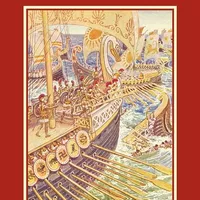18. The Adventures of Ulysses
"Come, my friends, 'Tis not too late to seek a newer world. Push off, and sitting well in order, smite The sounding furrows.
" —TENNYSON. When the great city of Troy was taken, all the chiefs who had fought against it, set sail for their homes, though few of them returned in safety. One, who wandered farthest and suffered most, was Ulysses. He had brought twelve ships to Troy, and in each ship were fifty men; but that was ten years ago, and half his men slept their last sleep on the plains of Troy. This is some of his story as the Greek poet Homer tells it:
"Now Zeus, gatherer of the clouds, aroused the North Wind against our ships with a terrible tempest, and covered land and sea alike with clouds, and down sped night from heaven. Thus the ships were driven headlong, and their sails were torn to shreds by the might of the wind. So we lowered the sails into the hold, in fear of death, but rowed the ships landward, apace. There for two nights and two days, we lay continually, consuming our hearts with weariness and sorrow. But when the fair-tressed dawn had, at last, brought the full light of the third day, we set up the masts and hoisted the white sails and sat us down, while the wind and the helmsman guided the ships.
"And now I should have come to mine own country all unhurt, but the waves and the stream of the sea and the North Wind swept me from my course as I was doubling Cape Malea and drave me wandering past Cythera. Thence for nine whole days, was I borne by ruinous winds, over the teeming deep; but on the tenth day, we set foot on the land of the lotus-eaters, who eat a flowery food. So we stepped ashore and drew water, and when we had tasted meat and drink, I chose out two of my fellows to go and make search, what manner of men they were, who here live upon the earth, by bread. Then straightway they went and mixed with the men of the lotus-eaters, and the lotus-eaters gave them of the lotus to taste.
"Now whosoever of them did eat the honey-sweet fruit of the lotus had no more wish to bring tidings nor to come back, but there he chose to abide with the lotus-eating men, ever feeding on the lotus and forgetful of his homeward way. Therefore I led them back to the ships, weeping and sore, against their will, and dragged them beneath the benches and bound them in the hollow barks. So they embarked and sat upon the benches, and sitting orderly, they smote the grey sea with their oars.
"Thence we sailed onward, stricken at heart. And we came to the land of the Cyclopes (Sicily). These lawless folk dwell in hollow caves on the crests of the hills. Now, there is a waste isle stretching without the harbour of the land of the Cyclopes, wherein are wild goats unnumbered, for no path of man scares them, nor do hunters resort thither. Moreover, the soil lies evermore unsown and untilled, desolate of men, and feeds the bleating goats. Yet it is in nowise a sorry land, but would bear all things in their season; for therein, are soft water meadows by the shores of the grey salt sea, and there the vines know no decay, and the land is level to plough. Also there is a fair haven, where is no need of moorings, but men may run the ship on the beach, and tarry until such time, as the sailors are minded to be gone and favourable breezes blow. " Leaving Sicily, Ulysses came to the Isle of the Winds, which floated about in the ocean, and still he wandered on and on in the unknown seas. Here is his account of how his ship was struck by lightning: "But now, when we left that isle, nor any other land appeared but sea and sky, even then a dark cloud stayed above the hollow ship, and beneath it, the deep darkened. And the ship ran on her way for no long while, for, of a sudden, came the shrilling West, with the rushing of a great tempest, and the blast of wind snapped the two forestays of the mast, and the mast fell backward, and all the gear dropped into the bottom of the ship. And behold the mast struck the head of the pilot and brake all the bones of his skull together, and, like a diver he dropped down from the deck, and his brave spirit left his bones. In that same hour Zeus thundered and cast his bolt upon the ship, and she reeled all over, being stricken by the bolt of Zeus, and was filled with sulphur, and lo, my company fell out of the vessel.
"Like seagulls, they were borne round the black ship upon the billows and never returned. I kept pacing through my ship till the surge loosened the sides from the keel, and the waves swept her along, stript of her tackle, and brake her mast clean off at the keel. Then I lashed together both keel and mast, and sitting thereon, I was borne by the ruinous winds. " All night he drifted, rowing with his hands, until he was cast on to an island where he had to remain for the next eight years. Homer, the blind old poet, gives a touching account of his home-coming at last. Ulysses returned as a beggar, broken down, weary, and footsore. None knew him again, neither his old father, nor his son Telemachus, nor his wife Penelope, only his poor old dog Argus knew him, and he just licked his tired feet and died of joy.

